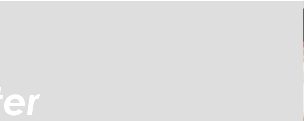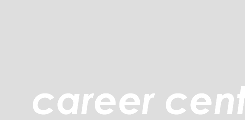 |
| |
| The biggest
mistake in interviewing is not being fully prepared. Use every
conceivable means possible to prepare for the interview and
allow ample time to fully prepare. Understand that interviewing
is a skill; as with all skills, preparation and practice enhance
the quality of that skill. Preparation can make the difference
between getting an offer and getting rejected.
There is no one "best" way to prepare
for an interview. Rather, there are specific and important
strategies to enhance one's chances for interview success.
Every interview is a learning experience, so learning that
takes place during the preparation and actual interview process
is useful for future interviews.
Initial preparation requires recent assessment
of skills, interests, values, and accomplishments; a re-assessment
and updating of one's resume; and research on the targeted
company/ organization and position. Preparation also includes
actual practice of typical and targeted interview questions.
Final preparation includes details of dress and appearance,
knowledge of the location of the interview, what to expect,
and protocols for follow-up, if you have an on-site interview.
|
| General
preparation before you begin the interview process: |
- Self-assessment:
We recommend self-assessment annually, but most people resist
this step. When one is unemployed or fearing lay-off, the
time is right for reassessing current skills, talents, abilities,
strengths, weaknesses, interests, and work values. In addition,
it is clearly time to re-examine accomplishments and achievements,
particularly those that may be relevant to a prospective
employer. I recommend keeping an on-going accomplishments
file in which to maintain such items as articles, congratulatory
letters, kudos from the boss or clients/customers, 360 evaluations,
and descriptions of successful activities as they occur.
In the course of daily business life, one often forgets
those notable successes.
|
- Updating
your resume: The
accomplishments file serves as a springboard to reassessing
your resume. The file contains content for selective resume
inclusion. If we assume that a resume must be accomplishments-based
rather than descriptive of one's responsibilities, then
the file serves to jog one's memory about recent notable
activities. Bare-bone the resume by removing all superfluous
and/or irrelevant material, all articles (a, an, the), and
work at getting it onto one page. Use functional headings
to help focus the reader on what you have done and what
you can do for the prospective employer. Be absolutely certain
it is error-free. For more help refer to our Resume Advice
section.
|
Let’s
now assume you have a specific interview lined up. |
- Research,
research, research:
Depending on available time, use every possible means to
learn all you can about the company and position. Use the
internet liberally to locate and read information about
the company/organization. Access books, journals, magazines,
newspapers and any reference materials useful for job-seekers!
Go online to the company's Web site as well as competitors'
sites. Use newspapers and news channels’ Web sites
to learn what's happening now in the news with this company
and its competitors. Use industry and business journals
to find business news by industry and/or location.
|
- Re-assessing
your resume: Even if you have sent your best-yet resume,
which was obviously successful in making the cut, review
it thoroughly and know everything that's on it. Be prepared
to discuss supplemental experiences that might be important
to this employer. Use a Job Interview Preparatory Sheet
to focus on experiences you feel are most relevant and match
them to the employer's needs.
|
Practicing
typical and targeted interview questions: Review typical interview
questions. Be able to answer the "Basic 3:” |
- Why
are you interested in this field?
- Why
are you interested in this company?
- Why
are you interested in this position?
|
| Be prepared
to discuss anything on your resume. Be prepared to answer questions/issues
you really don't want to answer. For example: |
- your
greatest weakness
- your
lack of related experience
- your
low score at college
- your
lack of leadership experiences
- your
record of job-hopping
|
| Practice
with a friend, career counselor or coach, or in front of a mirror.
Video or audio-tape your answers for future review. Scrutinize
how you look and sound. Note inflection of your voice, mannerisms
and gestures, facial expressions, poise, energy and enthusiasm
in your answers as well as in your body language. How can you
improve, enhance, develop, or revise your answers and/or delivery?
Because interviewing is a skill, you can only
improve your style and acumen with practice. You can always
prevail upon family or friends to help you prepare. ASK!!!
Ask too for genuine feedback that will be helpful in working
out the kinks. Practice is important too in assuaging fears
and nervousness. However, a degree of tension is beneficial
toward maintaining a level of alertness that causes you to
sit up straight and forward in your seat, leaning toward the
interviewer. The ideal is to strike a balance between poise/calm
and energy/enthusiasm.
Prepare questions to ask. These questions
should reflect your research on the company and position and
should never include questions whose answers are readily available
in company literature or Web site. Do NOT ask about salary
or benefits!
|
| |
|
|
|
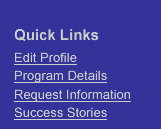
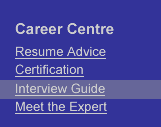
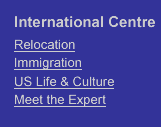
|
 |
